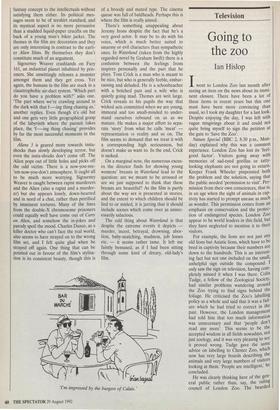Television
Going to the zoo
Ian Hislop
Iwent to London Zoo last month after seeing an item on the news about its immi- nent closure. There have been a lot of these items in recent years but this one must have been more convincing than usual, so I took my daughter for a last look. Despite enjoying the day, I was left with vague misgivings about it and could not quite bring myself to sign the petition at the gate to 'Save the Zoo'.
Nature Special (BBC 2, 8.30 p.m., Mon- day) explained why this was a common experience. London Zoo has lost its 'feel- good factor'. Visitors going away with memories of sad-eyed gorillas or tatty- looking elephants are not going to return. Keeper Frank Wheeler pinpointed both the problem and the solution, saying that the public needed 'permission to visit'. Per- mission from their own consciences, that is, in an age when the sight of animals in cap- tivity has started to prompt unease as much as wonder. This permission comes from an emphasis on conservation and the protec- tion of endangered species. London Zoo appear to be world leaders in this field, but they have neglected to mention it to their visitors.
For example, the lions are not just any old lions but Asiatic lions, which have to be bred in captivity because their numbers are down to the hundreds. This is an interest- ing fact but not one included on the small, unhelpful sign outside the compound. I only saw the sign on television, having com- pletely missed it when I was there. Cohn Tudge, a fellow of the Zoological Society, had similar problems wandering around the Zoo trying to find signs behind the foliage. He criticised the Zoo's labelling policy as a whole and said that it was a fail- ure which he had tried to correct in the past. However, the London management had told him that too much information was unnecessary and that 'people don t read any more'. This seems to be the accepted wisdom in all fields nowadays, not just zoology, and it was very pleasing to see it proved wrong. Tudge gave the same advice on labelling to Chester Zoo, which now has very large boards describing the animals and very large numbers of visitors looking at them. 'People are intelligent,' he concluded.
He was clearly thinking here of the gen- eral public rather than, say, the ruling council of London Zoo. The bearded
Tudge labelled these people as 'bankers' wives, the head of this . . . Lord and Lady Bong-Bong'. Neither the experts nor the keepers had much time for the Great and Good who have previously taken the major decisions about the Zoo. This is not really surprising given the history of bad manage- ment which the programme detailed. In one of the examples Chester was again used as a stick with which to beat London, and the programme compared their adver- tising campaigns. Having both taken on board the idea that conservation might be the answer to their problems, Chester had a huge success highlighting a rare baby black rhino. London meanwhile ran a dis- astrous series of adverts about tonking pandas'. The point that the London man- agement missed in their desire to appeal to the masses was that the joy of animal breeding is in the offspring, not in the leg- over. The ridiculous thing, according to Tudge, is that London Zoo does invaluable conservation work with rhinos anyway. It had just failed to tell anyone about it. And this is true of any number of other animals in London Zoo, right down to the British field cricket.
It is more difficult, of course, to be senti- mental about invertebrates and I have to admit that the film of crickets being released back into the wild in Sussex was less moving than the film of the mountain gazelles being released into the desert in Saudi Arabia. But the keepers were equally impressive and their ideas for the future of the Zoo equally convincing. Next time I'll sign that petition. If the Zoo is there.
Marlyn Harris is away.



















































 Previous page
Previous page